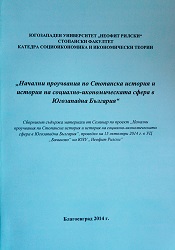ПРОБЛЕМИ НА ФИНАНСИРАНЕТО И СОБСТВЕНОСТТА НА ЧИТАЛИЩАТА В БЛАГОЕВГРАДСКА ОБЛАСТ В ИСТОРИЧЕСКИ КОНТЕКСТ
ISSUES ON THE FINANCING AND THE OWNERSHIP OF COMMUNITY CENTERS IN BLAGOEVGRAD DISTRICT IN A HISTORICAL CONTEXT
Author(s): Nikolay Kukolev
Subject(s): Economy
Published by: ЮГОЗАПАДЕН УНИВЕРСИТЕТ »НЕОФИТ РИЛСКИ«
Keywords: community center; a cultural institution; Renaissance; uniqueness; trustees; charity; cultural fund self-supporting; subsidizin
Summary/Abstract: In a foreign government (the Ottoman Empire) and missing their own national state institutions and Bulgarian society idea for an institution by means of culture and by its versatility and universality to support the consolidation of the Bulgarian national community and the modernization of social relationships within thereof. All care and maintenance material provision of Library activities during the Renaissance is assumed by the Bulgarian civil society: regular donations capita funds collected by school boards and emerging communities in towns and larger villages, aid Bulgarian emigration. In this respect no exception occurred during this era centers in Pirin Macedonia. After the liberation from Ottoman rule on March 3, 1878 a major commitment to the development of our national culture, in particular the development of community centers and their activities shall be borne by the restored Bulgarian state and its institutions. This change does not affect at this time Library activities in the southwestern Bulgarian lands, as according to the decisions of the Berlin Congress in the summer of 1878 the whole of Macedonia and Eastern Thrace were returned under the rule of the Ottoman Sultan. Heyday of the Library activities in the Pirin region occurred after his release as a result of the Balkan Wars of 1912-1913, the Bulgarian State ensure the development and maintenance of various community center activities, provides free estate to build a new community center more comfortable buildings. Municipal authorities also support the economic status and funding of community centers in direct cooperation with the community center boards and managements. After September 9, 1944 community centers fall under the more comprehensive control of the communist state, which gives to the community centers new tasks related to the establishment of the new ideological model of development of the Bulgarian state. Community center property was nationalized, the overall maintenance of community centers is entirely government commitment. After the changes of November 1989 and the social and economic transformations attitude of state institutions is erratic, no clear concept for the future social position of the community center as a significant cultural and social institution, and the financial commitments and their distribution state budget, already autonomous communities and civil society. State funding is shrinking dramatically, which is not compensated by alternative funding from the budgets of municipalities and NGOs, including some opportunities for self-support of the community center initiatives. With the adoption of the Law on Community Centers regulation is done the problem of ownership and funding opportunities for community center activities, consistent with the new socio-political and economic conditions in the country.
- Page Range: 304-316
- Page Count: 13
- Publication Year: 2014
- Language: Bulgarian
- Content File-PDF

